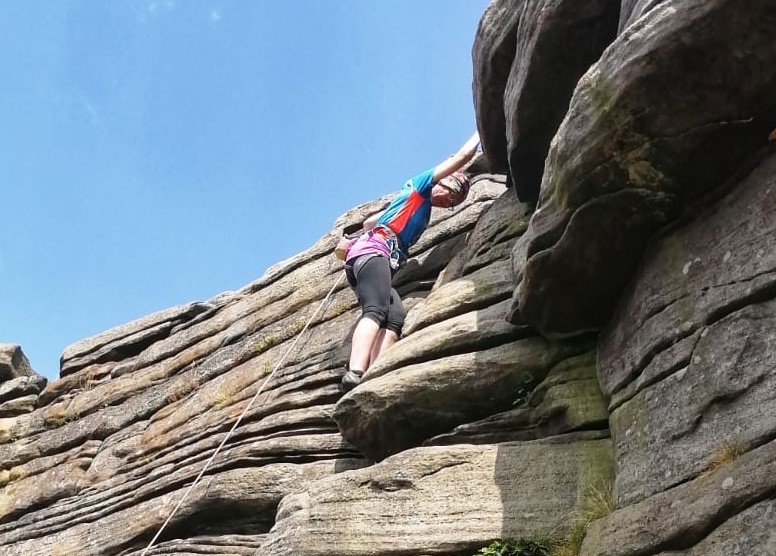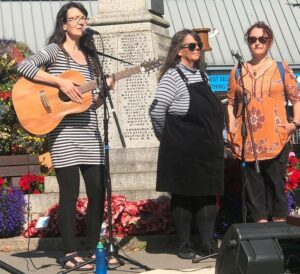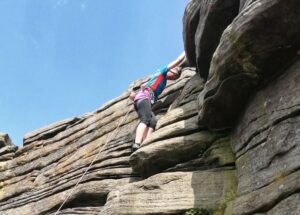
Part 2 MARK STATMAN: MEXICO AND THE POETRY OF GRIEF AND CELEBRATION
Part 2 of my interview with Mark Statman looks closely at Mark’s Latin American poetic influences, his life in Mexico and ends with an extract


I interviewed indie musician Maggie Braley who composes her own songs and leads community singing. Maggie, who is a rock climber from Belper, Derbyshire and a passionate environmentalist, says that learning to sing both folk and classical music, “has been a lifelong soul journey.”
Leslie: What were the early experiences that led you towards being a musician?
Maggie: My mum always said I sang before I talked; she’d hear me in the cot baby-humming “Where’s your mama gone?” which I’ve since found out was in the charts that year. And it was as an infant that I often heard my mum playing the piano; she played the same two Chopin Waltzes every time, those, and Scott Joplin’s Ragtime. I loved the cosy melancholy of the music along with knowing my mum was close by and, as a young child I’d often sit at the piano and make up little ditties or work out tunes I knew. From an early age I developed a lifelong attachment to classical music that included an ‘epiphany’ moment when listening to Brahms as a teen, and deciding, six months into my first year of ‘A’ levels, that I had to change courses and study music. Meanwhile my dad’s love of jazz and strong sibling influences of Motown, Soul, Punk and Electro gave me a joy in music that came through as an early teen when I taught myself guitar and began to write songs.
Leslie: How have you learned to sing and play your instrument(s) in the ways you want to?
Maggie: Having taught myself basic guitar at about aged 15 I got a fantastic part-time job the next year at a local Catholic youth centre; Most of my job was kitchen work, cleaning and cooking etc, but the best bit was that I got to choose and play hymns for Mass; the hymns were all folk-type music including beautiful reflective chants from Taize that have definitely influenced what I try to achieve now with my music.
I spent pretty much a year in this job, and it was during this period that I decided to study for music ‘A’ level. I got hold of a grade 6 piano piece, got books out of the library on how to read music and cribbed and struggled and practiced and practiced in every spare moment I had til I felt ready to audition. Although I succeeded, and I loved the course and achieved my ‘A’ level, I often felt embarrassed that I hadn’t done music exams before and couldn’t read music fluently, which made me very self conscious and self-critical. But my love for music kept me going, and over the years I settled into a more systematic approach to learning and practice. Although I was still performing, I gradually shifted away from playing the role of “the performer” into accepting more and more the role of “the learner”. That brought with it a very deep satisfaction; I remember with total joy for example the first occasion when I realised I was truly sight-reading a piece of music.
Singing was a little different; I took singing for granted as it felt effortless for me to perform and lead singing; that was until I began classical training! It was then that I realised there was so much more to explore in the voice, and that very humbling process is still ongoing, now working with my second of two wonderful teachers. It’s a lifelong soul journey I think and needs to be approached with patience and real humility, because for example, if you’re working on a difficult technical piece, you often have to consciously “let go” of a performance outcome and go right back to very simple steps and approaches to ‘open’ the voice.
Leslie: What are the working methods and stages that go into composing your music? How do you test it for quality and what do you keep / discard?
Maggie: My process of writing music is hard to explain. The best I can say is that if I’m working on a song or harmony or arrangement, it “comes” to me at all times of the day (and night!) and I often use my phone as a note pad/ voice recorder. Sometimes music comes to me when I’m running; just a phrase or fragment of melody, then I’ll go home, get the guitar out and work it up. It’s almost always the melody first, lyrics later. I try not to get caught up in getting things totally “perfect”, I just get something down and then keep playing and then usually it will refine itself by me feeling what sounds good and what reflects what I want to communicate best. I like to try to slow down, be ‘still’ before arranging or writing, I feel there’s more creativity that way. Also songs evolve through performance; over time I’ll add and take away elements according to a gut feeling I have.
Leslie: How has your expressive style and range changed as you’ve developed as a musician?
Maggie: I think in some ways I have a deeper sense of what is required now for performing and creating music. When I was younger I most definitely “felt” the music but was often caught up in needing approval and affirmation from the audience. Now, after years of writing and performing in ensembles, bands and solo, but also through classical training, I think I’m actually closer to just loving the music and the process of creating music for its own sake. An important change for me was also when I began to truly stop and listen to others (rather than singing along or wanting the song for myself). Listening carefully to other artists and musicians rather than trying to compete with them and make it all on my own, has engendered so much more depth and presence, more connection. Again, it’s ongoing.
Leslie: Who have been the guiding lights to your creative work – why them?
Maggie: It’s a difficult one as there have been so many! I am always inspired by the integrity of other artists and many of my friends who are artists have shown me the way or given me permission. I think two that come to mind initially are my friends Ola Wilson and Sally Lemsford (visual and performance artists). I met them both as I was beginning to expand my career in the arts and ended up creating lots of performance art with them for a few years on projects such as, “Making Her Visible” and “Hollywood or Spoon”. I grew up in a working class family where being an artist had little to no validity, especially being a female artist, so, although by then I’d done quite a lot of performing and writing, it was a brand new experience for me to take my creativity seriously, and that began a more inward journey of exploring my creativity. Some wonderful singer friends also: Beth De Lange and Deborah Allitt with whom I learnt that songs can be a form of storytelling. But finally my two singing teachers: my first teacher told me after an early lesson, “I can see we’re going to remove some blocks in you.” Which we most certainly did, but there was always a tension, maybe a throwback to being the one who couldn’t read music on my ‘A’ level course or perhaps my working class roots felt very uncomfortable in what I projected as an “upper class” environment. My teacher now is the most wonderful, well rounded classical singer who is now helping me almost let go of the perceptions I built up around classical singing and have fun with it.
Leslie: How do you find and adapt traditional melodies/music?
Maggie: My family had Irish catholic heritage and as a young teen I listened to a lot of Irish music. Plus there were strong traditional threads in the music I played at the Catholic youth centre. As time passed though, my inspiration deepened when friends introduced me to artists like Eliza Carthy and The Unthanks. In terms of writing songs inspired by folk music you can hook onto a little melody or a lyric phrase and usually the writing builds up from that. But what inspires me really is that there’s something deeper going on, a sort of magic: for me you’re connecting directly with lives and stories and places that were otherwise invisible or at the least, peripheral to the mainstream representations/ viewpoints on life. I’ve looked into my own family history (my roots are North East/ Sunderland and Liverpool) and there are loads of rich, sometimes dark stories: extreme rural poverty, a good sprinkling of illegitimacy, immigration and fatal mining accidents: all stories that at one time had no platform, so one of the elements that I’m working on now is telling those stories, through song and, more recently, poetry.
Leslie What is the relationship between the environment / climate and your music? How do you try to convey the urgency of these concerns?
Maggie: Like many people I have always felt a strong connection with nature; it’s integral to who we are, and so it makes sense that that connection will come through into my creative work irrespective of environmental concerns. However, over recent years, particularly inspired by the energy of the XR uprising in 2017, I have written, performed and collaborated with other artists eg, the wonderful artists Sarah Hinds and Brian Boothby on songs with strong environmental themes. For me the environment and nature is the core of our very existence as a species on the planet, so it makes sense to write about it! As well as this, I have children, and I work with children whose futures are going to be directly affected by this, so I write and sing on their behalf too.

Leslie: How does rock climbing fit into your creative life?
Maggie: It doesn’t, I just squeeze it in cos’ I love it! It’s interesting though, climbing requires similar skills to music: total focus in the moment, celebration of small successes (eg. on climbs that are at my strength and skill limit) and is really quite a mindful activity. Like running, I have found it “stills” the mind, and out of that stillness, new melodies have definitely come to me. The joyous immersion in nature and wild landscapes of course comes through in my writing too, and has inspired at least two of my environmental songs.
Leslie: What have you learned about yourself through music and your outdoor / nature activities?
Maggie: Ha ha, the whole of life is such a learning journey is it not!? The thing I’ve learnt most is humility. As a younger woman everything was about proving myself. It was “boom or bust” and trying to be invulnerable, which of course, can only lead to disappointment! But in the end music has forced me to learn to stop and begin again from the ground up; it has taught me very important lessons about careful listening, being patient with myself and about breaking things down and focussing on the small steps. Again with outdoor and nature activities I have/ am learning to slow down: ironic, as one of my main outdoor activities is running! But spending time outdoors is about saying “I’m making time to be outdoors, to be here, now”, which, as a person with very driven and ambitious tendencies (living in a very driven and “busy” culture) is a big step. It’s an important task that I think faces us all on this planet right now: learning to “be” rather than compulsively “do” all the time. I feel it’s the compulsive “doing” that has created the conditions for the climate breakdown we are facing as a species. But, as one of my songs says, “It can still be turned around, let the wave of change start here,” Right here.
Next week Amy Cunningham, artistic lead for Dark Horse Theatre, talks about shows led by learning-disabled actors and her work as a trustee of Theatre in Prisons and Probation (TIPP).
ABOUT LESLIE TATE’S BOOKS:

Part 2 of my interview with Mark Statman looks closely at Mark’s Latin American poetic influences, his life in Mexico and ends with an extract

I interviewed international poet and translator Mark Statman about Volverse/Volver, his 14th published collection. Mark, who has won national arts awards, is Emeritus Professor of Literary

I interviewed Lisa Dart, finalist in the Grolier, Aesthetica and Troubadour Poetry Prizes and author of The Linguistics of Light (poems, Salt, 2008), Fathom (prose

I interviewed writer Julia Lee Barclay-Morton about her experience of autism. Julia began as an experimental dramatist in New York, moving to the UK to

I interviewed Gillean McDougall from Glasgow, who edited the collaborative projects Honest Error (on Charles Rennie Mackintosh and his wife Margaret Macdonald) and Writing the
| Cookie | Duration | Description |
|---|---|---|
| cookielawinfo-checkbox-analytics | 11 months | This cookie is set by GDPR Cookie Consent plugin. The cookie is used to store the user consent for the cookies in the category "Analytics". |
| cookielawinfo-checkbox-functional | 11 months | The cookie is set by GDPR cookie consent to record the user consent for the cookies in the category "Functional". |
| cookielawinfo-checkbox-necessary | 11 months | This cookie is set by GDPR Cookie Consent plugin. The cookies is used to store the user consent for the cookies in the category "Necessary". |
| cookielawinfo-checkbox-others | 11 months | This cookie is set by GDPR Cookie Consent plugin. The cookie is used to store the user consent for the cookies in the category "Other. |
| cookielawinfo-checkbox-performance | 11 months | This cookie is set by GDPR Cookie Consent plugin. The cookie is used to store the user consent for the cookies in the category "Performance". |
| viewed_cookie_policy | 11 months | The cookie is set by the GDPR Cookie Consent plugin and is used to store whether or not user has consented to the use of cookies. It does not store any personal data. |